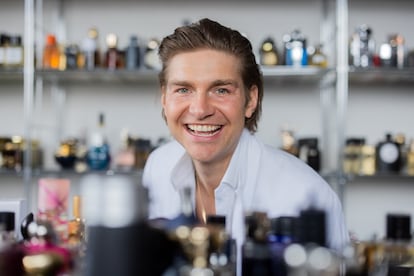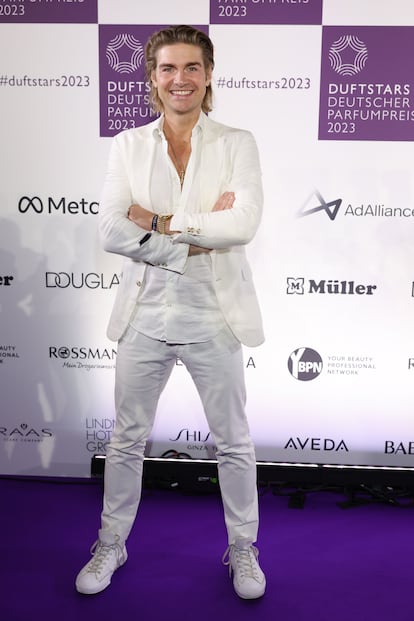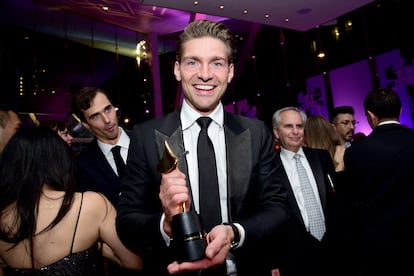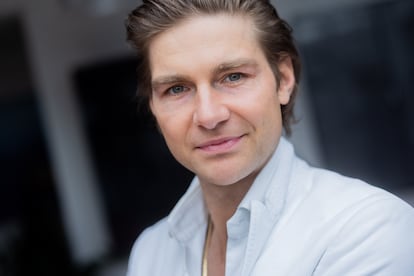‘That Ferrari isn’t going to pay for itself’: The controversial rise of Jeremy Fragrance, the perfume influencer
Daniel Sredzinski created an empire talking about fragrances on YouTube, but his erratic behaviors (and his selfies with German far-right leaders) are taking their toll

In 2001, with the U.S. economy in recession, lipstick sales increased by 11%. It was then that Leonard Lauder, heir and chairman emeritus of the Estée Lauder company, came up with the “lipstick index.” The theory states that in times of crisis, consumers are more willing to purchase affordable luxury items, such as cosmetics, than things like handbags or jewelry. However, the Covid-19 pandemic came to show that this thesis is not foolproof. According to the market research company The NPD Group, in 2020 purchases of beauty products dropped by 19% in the United States. Then, as restrictions eased, the situation improved. The big surprise came in 2021: although the average price of high-end fragrances increased by 15%, their sales rose by 49% in the United States, and for the first time in history they were equal to those of the almighty skincare sector.
The internet and social media have contributed to this paradigm shift. Founded in 2007, Fragrantica — the Wikipedia of perfume — lets users know and rate the olfactory pyramid of any fragrance, and thanks to hashtags such as #PerfumeTok (whose videos have garnered more than six billion views) and #PerfumeTikTok (already close to 14 billion views), TikTok drove 45% of sales made via social media in the United States in 2022. The influence of content creators, who talk about something as personal and intangible as a scent, is undeniable. And among them, one name stands out above the rest: Jeremy Fragrance.
From failed singer to successful businessman
Daniel Sredzinski, born in the German city of Oldenburg on February 5, 1989, wanted to be popular since he was little. When he turned 16 he began to take dance lessons, which led him to perform in several productions at the Oldenburg State Theater. In 2006, convinced that he had the makings of a pop star, he took the stage name Jeremy Williams and joined the boy band Part Six. The adventure was short-lived: a few months after releasing their first album, EMI decided not to renew their record contract. Far from giving up, in 2011 he released the solo single All of Me, and a couple of years later he tried his luck in a second band called Golden Circle, failing again: after the song Ibiza Forever, they disappeared from the map.

Without a concrete plan, he traveled to Hawaii, where he had a revelation. In an Abercrombie & Fitch store, he fell in love with Fierce, the aroma with which the firm sprays the interior of all its establishments. Not being an expert in perfume, upon returning to Germany he decided to delve deeper into the subject and open two YouTube channels, one in German and one in English, under the name Jeremy Fragrance. In his first video, published on June 2, 2014, he compared Jean Paul Gaultier’s Le Male to Paco Rabanne’s 1 Million. In the description, he included some affiliate links to purchase both bottles. In December 2016, two and a half years after debuting on the platform, Amazon paid him more than $5,000.
In that first stage, Jeremy simplified the complex language of perfumers, telling his subscribers which fragrances would generate the most compliments. He also started stopping people in the street to ask them what they thought about what he was wearing that day. He exuded charisma and, more importantly, credibility. In 2019, he announced a crowdfunding campaign to start his own brand, Fragance One, and produce his first perfume together with Alberto Morillas (who has created perfumes for Bvlgari and Zara): Office for Men. He set a goal of €25,000 ($27,500), obtaining a total of €780,149 (roughly $860,000). For 100 milliliters, he charged €125 ($140). Currently, the bottle costs twice that price on the Fragrance One website, the only place where it can be purchased. It was good business: each bottle costs approximately $5 to produce.
The evolution of a YouTuber
With millions of followers on social media (1.3 on Instagram, 2.2 on YouTube and 7.6 on TikTok), no influencer overshadows him in his field. Today, little remains of the former Jeremy. Especially since he discovered TikTok. His videos, increasingly histrionic and strange, are practically memes. The No Context Jeremy Fragance account collects many of them: out of nowhere he does push-ups with one hand, takes advantage of any occasion to shout his mantra “Kraft/Power” and there is no week in which he does not shed his white Patrick Bateman-style suit to dance half-naked in his apartment.
Fragrance reviews have been pushed into the background. Just one example is the 2021 video My Life Story, where he claims that his father used to beat him and his older brother, that he had sex with other men while he was part of Part Six and that a woman falsely accused him of rape. In the final minutes, before recommending Gentleman by Givenchy, he gets excited by thinking about the millions of women who get breast implants. Many of his subscribers assume that such manic videos are the result of a clear drug problem, but he denies it: his only addiction, he claims, are quail eggs.

“Jeremy has had a curious evolution, to say the least. Coinciding with the pandemic, he took a different, more bizarre turn,” says Marta Tamayo, co-founder and communications director of Le Secret du Marais, the first niche perfumery store that opened in Madrid, Spain. “I have come across him at several fairs and he is super nice. He doesn’t talk like he does in his videos. But I have also seen him filming himself bare-chested doing push-ups while it was raining in Milan. I don’t know where the character ends and the person begins. I don’t dare judge him in that sense, because his personality is ambivalent. Even though I don’t watch all his videos, he was the first to gain notoriety talking about perfumes on YouTube. He was the pioneer. Just for that, the world belongs to the brave. It doesn’t matter if everyone likes you or not: fragrances are not made to be liked by everyone, and every person has one or several different ones. Within that chaos that he can represent, he has achieved his goal.”
“He always wanted to be famous, and he does whatever it takes to be profitable,” says Juan López Becerril, CEO of the olfactory consultancy firm Huéleme Mucho, who at the beginning of 2018 started a YouTube channel dedicated to niche fragrances. “He naturally gravitated to what he really likes: lifestyle. He is not only popular for the perfumes; he is popular for being Jeremy. There are very few content creators who are recognized by name. He is one of them. He is at all times aware of his persona, which is why he slaves away. I once asked him if he didn’t get tired of waking up at 5:00 a.m. to do a ton of push-ups. His response was: ‘That Ferrari isn’t going to pay for itself.’”
Enemies arise
The origin of the Ferrari is somewhat murkier: he purchased it in 2017 a few weeks after begging his followers to support him on Patreon and ensuring that he would invest the money in a new computer. Today, that video is gone, as are the criticisms he received when he flaunted the sports car. He simply deleted all the negative comments.
In his native country, Jeremy has become a celebrity: in November 2022, he made the leap to the small screen when he took part in the 10th edition of Promi Big Brother, Germany’s version of Celebrity Big Brother. As was to be expected, he did his thing: he did not eat anything, subsisting only on water, and at no time did he take off his characteristic white suit, no matter how much the producers asked him to. On the sixth day, he left the show. He had accomplished his mission: as he said on set, in less than a week he had become “even more famous.”

Last December, for unknown reasons, he was invited to an event organized by the New York Young Republican Club in which Donald Trump was the keynote speaker. In addition to agreeing to go, he shared several selfies in his Instagram stories with two prominent personalities of the German extreme right: Alex Malenki, one of the main figures of the Identitarian Movement, and David Bendels, editor-in-chief of Deutschland-Kurier, a publication affiliated with the Alternative for Germany (AfD) party. He was also photographed with the Austrian populist politician Gerald Grosz. When Business Insider asked him why he posed with them and posted the pictures, his reply was that he usually takes photos with people who seem nice, and that he “didn’t know what Grosz represented.” Regarding Malenski and Bendels, he abstained from commenting.
The reactions came quickly. The streaming platform Sky TV removed from its catalog a documentary series starring Jeremy, Power, Baby!, released in October, and the publishing house Heel announced that there will be no future reprints of the book of the same title, published in the summer. Jeremy, however, does not seem bothered by any of this. On social media, he continues to dance.
Sign up for our weekly newsletter to get more English-language news coverage from EL PAÍS USA Edition
Tu suscripción se está usando en otro dispositivo
¿Quieres añadir otro usuario a tu suscripción?
Si continúas leyendo en este dispositivo, no se podrá leer en el otro.
FlechaTu suscripción se está usando en otro dispositivo y solo puedes acceder a EL PAÍS desde un dispositivo a la vez.
Si quieres compartir tu cuenta, cambia tu suscripción a la modalidad Premium, así podrás añadir otro usuario. Cada uno accederá con su propia cuenta de email, lo que os permitirá personalizar vuestra experiencia en EL PAÍS.
¿Tienes una suscripción de empresa? Accede aquí para contratar más cuentas.
En el caso de no saber quién está usando tu cuenta, te recomendamos cambiar tu contraseña aquí.
Si decides continuar compartiendo tu cuenta, este mensaje se mostrará en tu dispositivo y en el de la otra persona que está usando tu cuenta de forma indefinida, afectando a tu experiencia de lectura. Puedes consultar aquí los términos y condiciones de la suscripción digital.









































